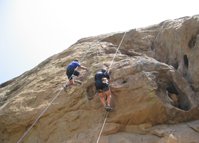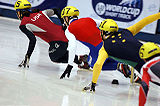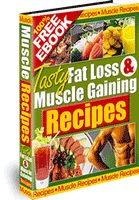|
Home :Sports Diet: Diet of Athlete
DIET OF ATHLETE
For some reason I have a slow metabolism. I can work out 20 hours per week and not lose weight. I have to be very diligent with I just read an article about the Olympic gold medalist speed skater Apollo Ono. Though his entire life revolves around training, he has to watch every bite. He puts on weight very easily, which is not good for his explosive sport. DIET OF ATHLETE: BMI index
Consider track athletes. Sprinters need more muscle than distance and marathon runners. Sprinters usually have a Body Mass Index or BMI of around 23, while distance runners have a BMI of 20 to 21. Body Mass Index is the measurement of a person's weight according to their height. So according to how tall you are, you are able to see if you are too fat or too skinny. You can compute your For instance if you are 5' 2" and weigh 145 pounds, that is 1.57 meters (1 inch = .0254 meters) and 65 kilograms. 65 divided by (1.57 x 1.57) = 26 body mass index People with a BMI of 25 above are considered overweight. Those with a BMI of 18.5 are considered underweight. But for athletes, having a BMI lower than 20 is actually already dangerous. DIET OF ATHLETE: What to Eat
So if you weigh around 77 kilograms, or approximately 170 lbs, you should be eating around 108 grams of protein daily. Additionally, you should also cut out 100% of saturated fats. Do not cut all fats. You need these. I did this one time for over 6 weeks. Though I did lose weight, it created some health problems. A diet of mostly vegetables with high dietary fiber is great for weight loss. Although you need your protein, you should try to cut down on meat, even lean meat. Beef and pork are usually made up of 50% fat, and these are not absorbed well by the body when training. Instead of strengthening the muscles, they are instead working hard to burn the excess fat off. Your workout should also be streamlined to help you burn as much fat as possible. Get a lot of low impact aerobic exercise, combined with short bursts of high impact activity. Interval training actually helps you burn the fat around your organs. This means long periods of steady exercise to get your heart pumping without exhausting all your energy, such as jogging or a fixed medium speed on the bike. Add short sprints that will raise the heart-rate every A great way to do this is through CrossFit. When losing weight, you have to suppress your appetite, but this is easier said than done. Hammer Nutrition has an appetite suppressant that is all natural. Your body loves your fat. Strange, but true. If you have managed to remove all your body fat and don't consume any fat to add to your system, your body will produce its own fat. And before you are able to remove all fat from your body, a battle of wills between you and your body will ensue. This is in the form of your metabolism grinding to an all time low. Our bodies automatically change to ensure that we don't burn the little fat left on the body. Diet and training are not friends. Athletes in particular are too focused on their upcoming event to make practical decisions about weight loss. You should try to lose weight during the off-season, instead. Sure, the off season is like a vacation from training and trying to keep your weight at a particular level is not fun. It seems we could eat whatever we please. It is actually more practical to do all your weight losing at this time so that when training season comes around, all you have to do is maintain your ideal body weight. Then you can totally concentrate on maximizing your performance. REFERENCES FOR DIET OF ATHLETEDr. Bill Misner,PHD, CCN, premier researcher and product developer for Hammer Nutrition. |
Sign up for our Extreme Adventure FREE Sports-ZineExtreme Adventure Sports Zine |
 Diet of Athlete: The diet of the athlete varies from sport to sport. In an endurance based sports we need strength, endurance and consistent energy levels. Muscles, energy levels and weight are affected by the kind of food you eat.
Diet of Athlete: The diet of the athlete varies from sport to sport. In an endurance based sports we need strength, endurance and consistent energy levels. Muscles, energy levels and weight are affected by the kind of food you eat.  what I eat, to stay at training weight.
what I eat, to stay at training weight.  People are not created equal, athletes are not created equal either.
People are not created equal, athletes are not created equal either. BMI by dividing your weight in kilograms by your height in meters squared (multiply it by itself). To convert pounds to kilograms, divide your weight in pounds by 2.2 .
BMI by dividing your weight in kilograms by your height in meters squared (multiply it by itself). To convert pounds to kilograms, divide your weight in pounds by 2.2 . To lower your body fat without affecting your muscle mass, you have to decrease your carbohydrate by 25% and keep your
To lower your body fat without affecting your muscle mass, you have to decrease your carbohydrate by 25% and keep your  now and then. Don't lengthen the period of the high impact aerobic activity to match the low impact. Instead of building stamina, you'll just be overworking your muscles, which should be primed for your sport. Enhance your muscles instead with strength lifting exercises.
now and then. Don't lengthen the period of the high impact aerobic activity to match the low impact. Instead of building stamina, you'll just be overworking your muscles, which should be primed for your sport. Enhance your muscles instead with strength lifting exercises.





